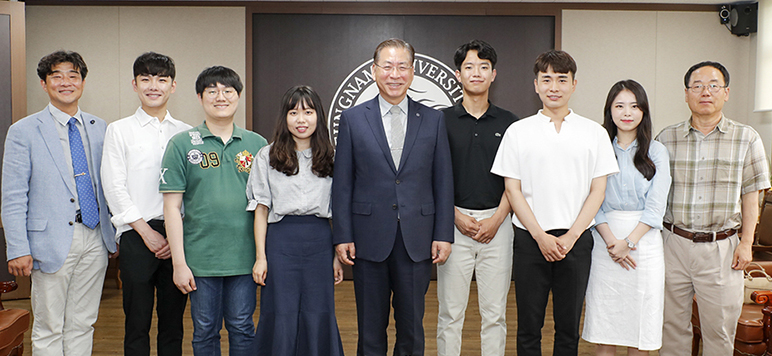Six from YU Pass ‘2018 National Position Regional Talent Grade 7’ N
No.89069- Writer pr
- Date : 2018.06.27 11:29
- Views : 7955
4 in 2016, 5 in 2017... Number of passes increase every year thanks to systematic support from the university
[June 19, 2018]

<YU graduates who passed the ‘2018 National Position Regional Talent Grade 7 Trainee Test’>
(from left to right: Employment Office Director Lee Seung-woo, Park Geon-ho, CHoi Joon-young, Lee Hae-jung, YU President Sur Gil-soo, Lee Yang-hee, Lee Min-gyu, Park Jung-min, Department of Police Administration Professor Sung Do-gyeong)>
(from left to right: Employment Office Director Lee Seung-woo, Park Geon-ho, CHoi Joon-young, Lee Hae-jung, YU President Sur Gil-soo, Lee Yang-hee, Lee Min-gyu, Park Jung-min, Department of Police Administration Professor Sung Do-gyeong)>
In this year’s test, a total of 498 students from 111 universities around the nation and 130 were selected. Six of them comprised of four in administrative and two in technical positions were from YU. In administrative positions they are Lee Yang-hee (26, graduated from the School of Economics and Finance), Lee Min-gyu (25, graduated from Department of Food Science and Technology), Lee Hae-jung (24, graduated from Department of Media and Communication), Park Jung-min (22, graduated from Department of Public Administration), and from technical positions, they were Park Geon-ho (26, graduated from the School of Mechanical Engineering), and Choi Joon-young (25, graduated from the Department of Mechanical Engineering).
The number of passers from YU has been continuously on the rise from four in 2016 to five in 2017. It is judged that the systematic and assertive support by the university is resulting in such heightened competitiveness. YU helps students throughout the entire process from recruiting college recommendee to written tests and applications.
Lee Min-gyu, who graduated in August of last year, said, “The regular lectures and employment study groups offered by the university help a lot. In particular, thanks to the consideration from the school and advising professor, I was able to take the official position aptitude class in the second semester of last year despite already graduating, which helped me a lot in passing the written test.” He added, “After completing the training, I would like to utilize my major next year and work at the Ministry of Trade, Industry and Energy or the Ministry of Agriculture, Food and Rural Affairs.”
Around June of every year, YU offers regular lectures on written tests, etc. by recruiting students preparing for the ‘National Position Regional Talent Grade 7 Trainee Test’ and assigns an advising professor (School of Police Administration Professor Sung Do-gyeong) for individual guidance. Also, the Employment Office offers online lectures and supports employment study groups to prepare for written tests and also helps students prepare for interviews through meetings with seniors who passed the test in the past.
YU Employment Office Director Lee Seung-woo said, “The secret to the high passing rate is the university’s systematic support that provides practical assistance to students preparing to enter the public sector from public position aptitude tests to final interviews.” He added, “We have displayed significantly higher passing rates not only in national position regional talents, but also for general public employee tests compared to other universities. Students who are interested in working in the public sector will receive a lot of assistance by participating in programs offered by the university.”
Meanwhile, those who passed will be admitted to the National Public Employee Talent Development Center in the first half of next year and participate in a four-week program for adapting to public positions and basic training to improve work competence. Afterwards, they will work as trainees at central administrative institutes (ministries, offices, etc.). Their training period is approximately one year and after completing the work training, they will be appointed as regular public employees after receiving work execution evaluations.